Determining which type of butter to buy can get confusing because there are usually many options. The different types of butter at your grocery store might include unsalted, salted, spreadable, imitation butter, whipped, and a few more choices. However, many people often wonder the difference between salted and unsalted butter (sweet butter). If you placed the two sticks side-by-side you likely would not be able to tell much of a difference visually. It is even easy to mistakenly pick the wrong box at the grocery store if you don’t read the box carefully.
The only difference between salted and unsalted butter is that salted has salt added as an ingredient and unsalted does not. It is that simple. All other ingredients are the same.
Often times when baking you will specifically see unsalted butter as one of the ingredients. Unsalted is often preferred because it gives the baker the option to adjust the salt level without having to worry about the extra salt content in butter. The amount of salt in salted butter varies from brand-to-brand (sometimes a lot) so unsalted butter gives the power to the baker to control the salt.
In most cases, you can use salted butter when unsalted butter is called for in a recipe. However, some people like to reduce the salt if the recipe actually calls for added salt. You can get technical about it and calculate the exact amount of salt reduction based on the sodium content on the label. Not many people have time for tricky conversions. Mrs. Fields, the famous cookie makers, recommends generally decreasing the salt by 1/4 teaspoon per one stick. You can also just use salted butter without decreasing the salt that the recipe calls for. You will notice a taste difference, but it likely won’t be significant for most recipes.
The advantage of using salted butter is that the salt makes it excellent to eat directly on top of things like toast or a baked potato. The added salt provides a built-in seasoning, which would otherwise make for a bland topping. Think of salted butter as traditionally more of a condiment or spread. Salted butter also has a longer shelf life because the salt preserves the butter. Unsalted butter will stay fresh approximately 3 months while salted butter stays fresh an extra two months. If you tend to not use your butter very often, you may want to consider keeping salted butter around instead of unsalted to give yourself additional time to use it.


